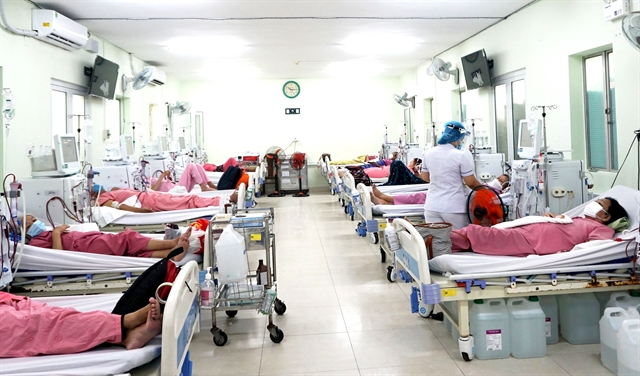 Society
Society

 |
| Patients undergoing dialysis at Chợ Rẫy Hospital in HCM City. — VNA/VNS Photo |
HÀ NỘI — Chronic kidney disease, once predominantly seen in older adults, is now increasingly affecting younger people, raising serious concerns across the healthcare system.
Kidney disease among the young not only causes serious impacts on their physical health and quality of life, but also imposes a significant financial burden on their families and society.
According to the latest data from the Ministry of Health (MoH), Việt Nam currently has over 10 million people living with chronic kidney disease. Of these, around 26,000 are in end-stage kidney failure and require regular dialysis or kidney transplants.
The number of young patients is rising at an alarming rate, with most only receiving a diagnosis after their conditions have become serious, often due to a lack of regular health check-ups and a tendency to dismiss early warning signs.
At Chợ Rẫy Hospital in HCM City, a top-level kidney treatment facility, it is no longer rare to see patients in their early twenties already dependent on dialysis or facing high-risk transplants.
One such case is 24-year-old N.T.M.N, a resident of District 5 who was diagnosed with kidney failure in 2022 at Nguyễn Trãi Hospital.
N. was initially sceptical of the results and sought a second opinion at Chợ Rẫy Hospital, where she was shocked to learn that she had already entered the end stage of the disease and would need dialysis three times a week, each session lasting three to four hours.
After months of gruelling treatment, N. underwent a transplant with her mother as the donor. Now, she faces a long and arduous journey of monthly follow-up visits and takes anti-rejection medications.
Many young people find themselves in the same situation as N. – Võ Tuấn Kiệt, born in 2004 in Bến Tre, discovered his kidney condition while still in school, when a sudden high fever led to a hospital visit where he was diagnosed with kidney failure.
Kiệt had to leave school to begin treatment.
“I think many young people, like me, often stay up late, drink soda or eat oily food. These are habits we need to change if we want to stay healthy,” Kiệt said.
Hospital overloaded
Chợ Rẫy Hospital’s kidney transplant department is always overloaded. Many are students or young workers – people who never imagined they might be diagnosed with what was once considered a disease of the elderly.
Ngân, 27, an accountant in Đồng Nai Province, said she experienced no unusual symptoms and had a balanced diet and healthy lifestyle.
But when undergoing medical examination for prolonged fatigue, she was diagnosed with late-stage kidney failure.
“I was in complete shock. I thought I was healthy, and there were no noticeable symptoms. But by the time I found out, it was too late,” said Ngân.
Health experts say that this is one of the most critical issues of kidney disease – silent progression with few visible symptoms.
Most patients only discover their condition once it has become serious, requiring expensive, long-term treatments.
A patient undergoing dialysis two to three times per week, for three to four hours each session, can face millions of đồng in monthly medical expenses, in addition to travel costs and lost income.
Even with health insurance, these financial burdens can be overwhelming.
Meanwhile, kidney transplants are considered more effective but can cost hundreds of millions of đồng, and not everyone can find a compatible donor.
Dr Nghiêm Trung Dũng, director of the Centre for Nephrology, Urology, and Dialysis at Bạch Mai Hospital said that unhealthy eating and lifestyle habits are major contributing factors that accelerate metabolic disorders among young people, including chronic kidney disease and glomerulonephritis (inflammation of the kidney’s filters).
Speaking to Voice of Vietnam (VOV), Dũng said that many young people have high-risk habits such as frequent consumption of sugary drinks, excessive salt intake, overuse of painkillers, using supplements of unclear origin, staying up late, or limited physical activity.
Therefore, health experts recommended regular health screenings for early diagnosis, higher awareness and adopting healthier living habits to reduce the risks of chronic kidney diseases. — VNS




